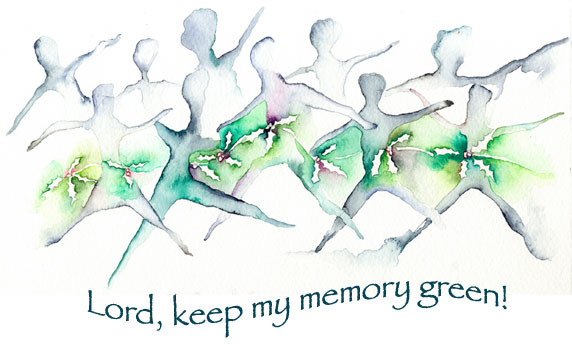Spirit, Learning and Life
Forming character through the insights of literature, contemporary culture and Scripture.
Keep My Memory Green
by Arthur Paul Patterson
I'M TRYING TO forget. I'm wishing there was a way to wipe out that part of my brain's hard drive which stores hurtful emotional memories. I don't mind learning from mistakes or analyzing the causes of my pain, but reliving all that pain is excruciating! I don't want to see those sad, mental pictures. They are over, done with, and besides my life now is...well, at least it is not as chaotic. It's a gray day as I stare out my window, watching the blue ice melt in patterns on the window pane. But those patterns take on shapes, tiny illustrations of past events, the very ones I am trying to forget. These are not Jack Frost's happiest pictures, more like Dore's illustrations of Dante's inferno. Remember, I am trying to forget.

Beyond the pictures on the pane outside my front window, I witness a disciplining. I am not sure I want to call it that. Some little guy is being hollered at by his mother. I can't hear what she is mouthing but his brown eyes are welling with tears. Her face is inches from the little boy's forehead and rage steams from the sides of her winter parka. Who knows what the little boy did; who knows what the angry mother has gone through today?
Who cares! What I know is that, coupled with those shapes on the window, my memory blockade is breached. I am back on the floor of my childhood home on Ingersoll Street. I recall another little guy with tears in his eyes and a steaming face snarling inches away. But I am trying to forget, remember; so I put on some music. Whatever is in the CD player will do. Ah, good instrumental music by the Beatles, by a cellist. What is that playing? In My Life by Paul McCartney. My memory is actually chasing me. That's insane. I refuse to change the CD. What's the point? I drift off, not in reverie but in sore memory.
"So you want to forget, do you?" he mutters.
"More than anything else," l respond.
"It can be arranged, you know. As long as you promise to take the gift with you, to other hurting souls."
"I don't think I want to fiddle with other people's memories. What will be left of them if their memory is gone?" I object.
"It is not the memories that are the problem, but the reliving of them, the re-experiencing of those events, the stormtrooper bang at memory's door. Other victims of horrible events would thank you for it, as you will thank me.”
"Hey, nothing comes without a price tag these days," I say, backing away from the invitation.
“I told you what you need to do, forget your own sorrow and help others forget theirs. Get over it for crying out loud! Move on, man," says the phantom double image of myself reflected in the window pane.
I refuse that gift of forgetfulness, that soothing temptation to steel my heart against its longings. Sad experiences give me hope because they cause me to know love. By not feeling my limitations and humanness, I might become hard as ice to my hopes, dreams and best wishes. To see that child out my window and not feel the pang in my heart would be to become cold-hearted. My identification with the child is what gives me the empathy and compassion toward both the mother and the boy in their tug-of-war of hearts.
I refuse that gift of forgetfulness because I need my memories as they are, uncured by reason or so-called objectivity. I need memory in its raw state. It hurts but it makes me willing to heal. To bend down toward that little boy when I go by him on the blustery street, pat him on the head, and let him hug my warm Husky dog. If I forgot my pain, I might forget him too quickly. To stop and remember that, in as much as I do it to him, another little boy will have picked himself off the kitchen floor and move toward recovery. That is why we tell our stories at meetings, in groups, and in letters - so we don't forget to remember. Keeping our memories green means keeping our emotions sappling-fresh, so we can pass on the news that love, even sad love, grows best in tears, not numbness.
(Story inspired by Charles Dickens' Christmas Book The Haunted Man.)
